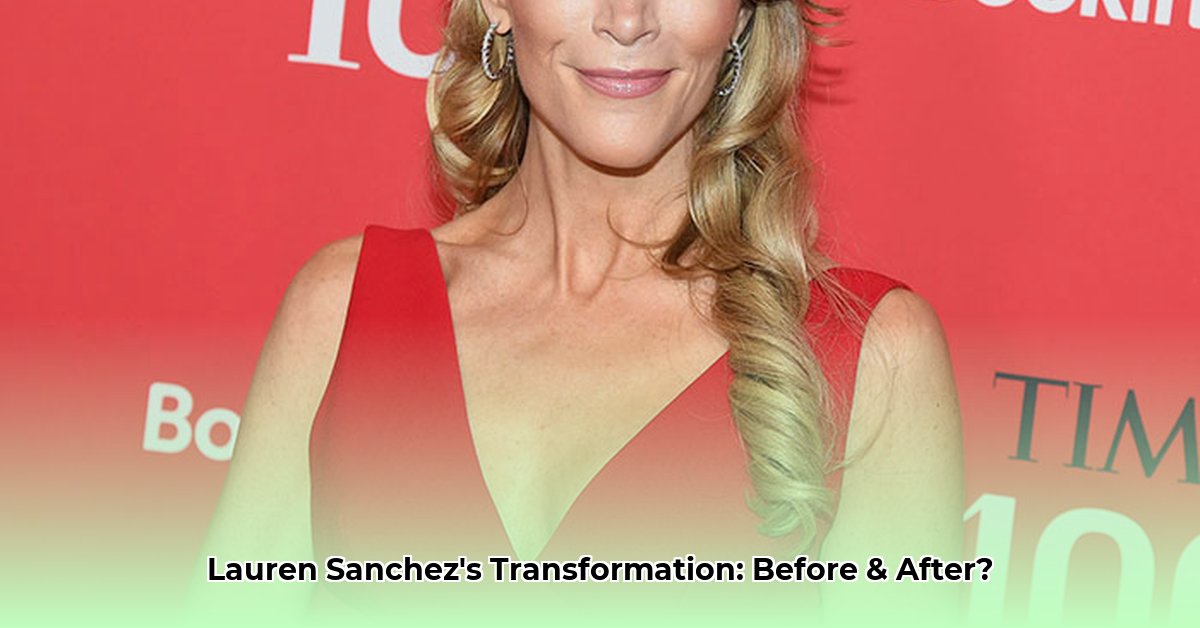
The Shifting Landscape of Lauren Sanchez's Appearance
Much speculation surrounds the perceived changes in Lauren Sanchez's appearance over the years. While many online sources point to potential cosmetic procedures, definitive proof remains elusive. This analysis aims to explore these alleged changes objectively, considering various factors beyond surgical intervention. It's crucial to differentiate between informed commentary and unsubstantiated rumour-mongering. "Before and after" images circulating online fuel public debate; however, these images, without verifiable context, offer limited evidentiary value.
Unpacking the Visual Clues: A Critical Examination
Online discussions often highlight apparent changes in Lauren Sanchez's facial features. Certain commentators point towards potential lip fillers, a possible facelift, or even buccal fat removal as explanations for alterations in her facial structure and appearance over time. However, it is vital to acknowledge the significant impact of factors other than surgery. These factors include:
- Professional Makeup Application: Skilled makeup artists can dramatically alter facial contours and features.
- Advanced Skincare Regimens: High-end skincare products and treatments can significantly improve skin texture, reducing wrinkles and blemishes and enhancing an overall youthful look.
- Lifestyle Changes: Diet, exercise, and stress levels all have a substantial impact on one’s appearance. Improvements in any of these areas can lead to improvements in overall health and a more youthful appearance.
- Natural Aging: Changes in bone structure and skin elasticity occur naturally over time, subtly altering facial features.
The Importance of Responsible Reporting & Analysis
It's paramount to approach this topic with journalistic integrity. Speculative statements must be clearly identified as such, avoiding any misrepresentation as confirmed facts. Responsible reporting incorporates several key elements:
- Contextualisation of Images: Analysing photographs requires accounting for lighting, angles, and photo editing, which can significantly alter one's perceived appearance.
- Attribution of Sources: All claims must be backed by credible sources. Avoid relying on anonymous sources and unsubstantiated online commentary.
- Expert Consultation: Obtaining insights from qualified plastic surgeons provides valuable perspective based on professional medical knowledge and experience.
- Ethical Considerations: Maintaining respect for individual privacy and avoiding language that promotes body-shaming or negative judgments is crucial for ethical and responsible reporting. This includes refraining from drawing definitive conclusions without irrefutable evidence.
The Public's Fascination: A Multifaceted Exploration
The significant attention paid to Lauren Sanchez's appearance highlights our society's inherent fascination with celebrity image and the pervasive influence of social media. The rapid dissemination of images and opinions online often creates an echo chamber effect, making it challenging to separate fact from fiction. This phenomenon necessitates responsible media practices that prioritize accuracy and ethical considerations. Should we, as a society, be more critical of the often-baseless narratives surrounding celebrity appearances? Could greater media responsibility reduce the pressure on public figures and promote a healthier online environment?
A Balanced Conclusion: Acknowledging the Uncertainties
While noticeable changes in Lauren Sanchez's appearance have sparked widespread speculation, it remains impossible to definitively attribute these changes solely to cosmetic procedures. A range of factors play a role, and responsible reporting should acknowledge these complexities. To responsibly answer the question "did she or didn't she have plastic surgery?" requires avoiding unsubstantiated claims and promoting a balanced view of the many elements that contribute to one's overall appearance. The absence of confirmed evidence necessitates avoiding definitive statements and concentrating on responsible reporting.